He started $1.7m repair company at 16: Meet the young bosses who prove that age is just a number
Sign up now: Get tips on how to grow your career and money
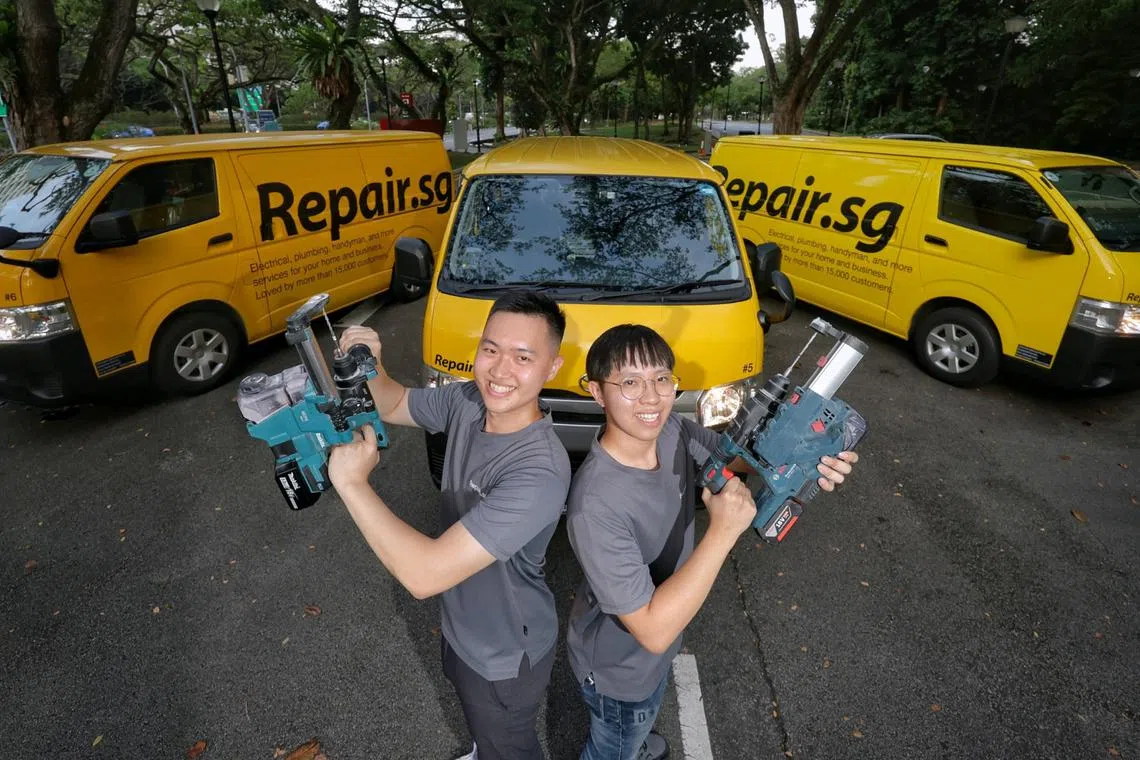
Mr Zames Chew (right), 25, started Repair.sg at age 16. His younger brother Amos, 23, is chief operating officer.
ST PHOTO: KEVIN LIM
Follow topic:
SINGAPORE – Mr Zames Chew and Mr Muhamad Imran Mean were only 16 when they started their first big businesses. Ms Charmaine Low had just turned 20.
Age was a challenge but not an obstacle for these young bosses in their 20s, who leveraged fresh perspectives and youthful energy to power through trials.
Like them, Gen Z youth are an entrepreneurial force to be reckoned with today, with multiple surveys around the world indicating that many in this generation prefer to be a boss than to be an employee. A 2022 survey commissioned by Microsoft, for instance, showed that 62 per cent of American Gen Z youth have created or are planning to launch a business. They start young with side hustles, thanks to their native proficiency in the digital world and social media.
There is also a vast difference in the environment supporting aspiring young bosses now.
Mr Martin Tan, co-founder of Halogen Singapore, a non-profit that supports youth to realise their potential, says: “Twenty-one years ago, when Halogen was founded, there was no such thing as entrepreneurship for young people. There wasn’t even a lot of emphasis on leadership.”
“Today, our young people have the appetite and aspiration to build something of their own. They are willing to try and more willing to fail,” adds the 47-year-old.
What makes them different from their Gen X parents is their desire for social impact.
“Gen Zers want to feel that they’re contributing to something that’s larger than themselves,” says Ms Lim Ee Ling, 38, chief executive of non-profit Wavesparks, which runs Young Founders Summit (YFS), a six-month start-up incubator programme for 15- to 20-year-old aspiring entrepreneurs from the greater Asian region.
Founded in 2018, YFS has engaged with 4,000 youth and mentored 560. Its 2024 summit cohort had 80 participants, of which 35 per cent were from Singapore. Others hailed from India, South Korea and Kazakhstan.
Driven by the world they live in, Gen Zers are self-directed learners and early adopters of new technologies such as artificial intelligence, and want to see results faster, says Ms Lim. She is also executive director of market launch at 500 Global, an American venture capital firm.
She says YFS’ mentors, whose ranks have included leaders from super app Grab and automotive marketplace Carro, have been surprised by how willing Gen Z participants are to listen and be coached.
“They don’t expect them to be this hard-working. The mentors tell me they’re all curious, hungry and driven. In Gen Z speak, they call this ‘locked in’ or fully committed.”
Learn what drives three young bosses whose passion and perseverance are an inspiration to all ages.
It cost him $30 to start a repair business, now it brings in $1.7 million
When his parents struggled to find trustworthy property repair and maintenance service providers, Mr Zames Chew spied a gap in the market.
Inspired by the rise of apps like Uber and Grab, he wanted to build a platform where customers could book a good repair service online.
Never mind that he was just 16.
Mr Chew started his business in early 2016, after his O levels, but his father had to register the company, now known as Repair.sg, under his name as his son was underage.
Repair.sg, which offers handyman, plumbing, electrical and air-conditioning services, chalked up over $1.7 million in revenue in 2024. It has serviced over 20,000 customers since it started eight years ago.
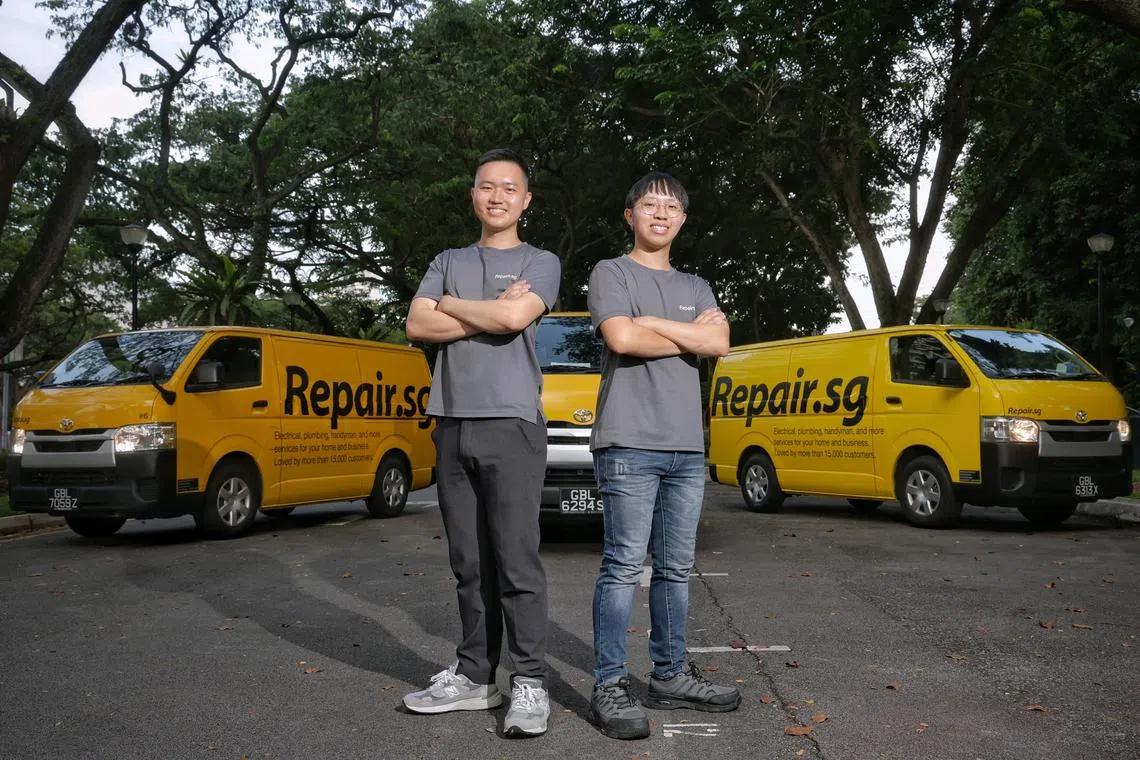
Mr Zames Chew (right) started Repair.sg after his O levels in 2016 and roped in his brother Amos to help out.
ST PHOTO: KEVIN LIM
Now 25, Mr Chew and his brother Amos, 23, co-founder and chief operating officer, are its only shareholders.
“I’ve always wanted to carve my own path,” says the chatty Mr Chew, who remembers spending most of his after-school hours programming or taking things apart.
He once dismantled a family computer and failed in reassembling it – to the consternation of his parents, who worked as property agents.
His entrepreneurial skills bloomed early. In Chongzheng Primary School, he sold candy and other small items to classmates.
During his teenage years, his love of creating physical and digital projects led him to start a few short-lived businesses while at Pasir Ris Secondary School. These included a tuition agency, as well as website building and search engine optimisation (SEO) services.
While studies were never a priority for him, his parents insisted he get at least a diploma. His L1R4 score of eight allowed him to enrol on a diploma of international business programme at Singapore Polytechnic.
“I graduated at the bottom of my cohort, but that’s because I was focusing on the business,” says Mr Chew. He roped in his brother, then in secondary school, to help out whenever he could.
All it took was $30 to register the domain name and $5 a month for website hosting.
He built the website and software the company runs on, and started advertising online. Thanks to his SEO skills, honed by helping his father’s friends market their businesses online, he started getting leads in a few weeks.
“When the calls started coming in, I honestly didn’t know how to fulfil the services,” he says, explaining that he initially just wanted to generate leads.
So he would cold call repair services listed in The Straits Times’ Classifieds section and refer the job to them, taking a small cut of the fee or sometimes none at all, just to keep the customer. His father helped to field calls and coached the then shy teen on managing customers and vendors.
However, their standards did not meet the kind of experience he wanted to deliver, as the service providers were not responsive to customer complaints, he says. He also saw foreign workers in the trade being ill-treated.
Given his youth, the vendors did not take his suggestions seriously, says the boyish-looking Mr Chew, who is sometimes still mistaken for a teen.
After about two years, the brothers had saved enough to rent a van and started doing small jobs themselves, such as replacing lightbulbs. Their business model evolved from a marketplace to a handyman service.
“I did not want to be just another platform that took its cut and washed its hands of the matter. I wanted to create a better place for both workers and customers, so I decided I would do my best to fulfil the service myself,” he says.
Repair.sg’s fees start at $75 to replace a ceiling light, including parts, transport and labour, and can run into five-figure sums for works such as painting and flooring changes for companies with multiple branches.
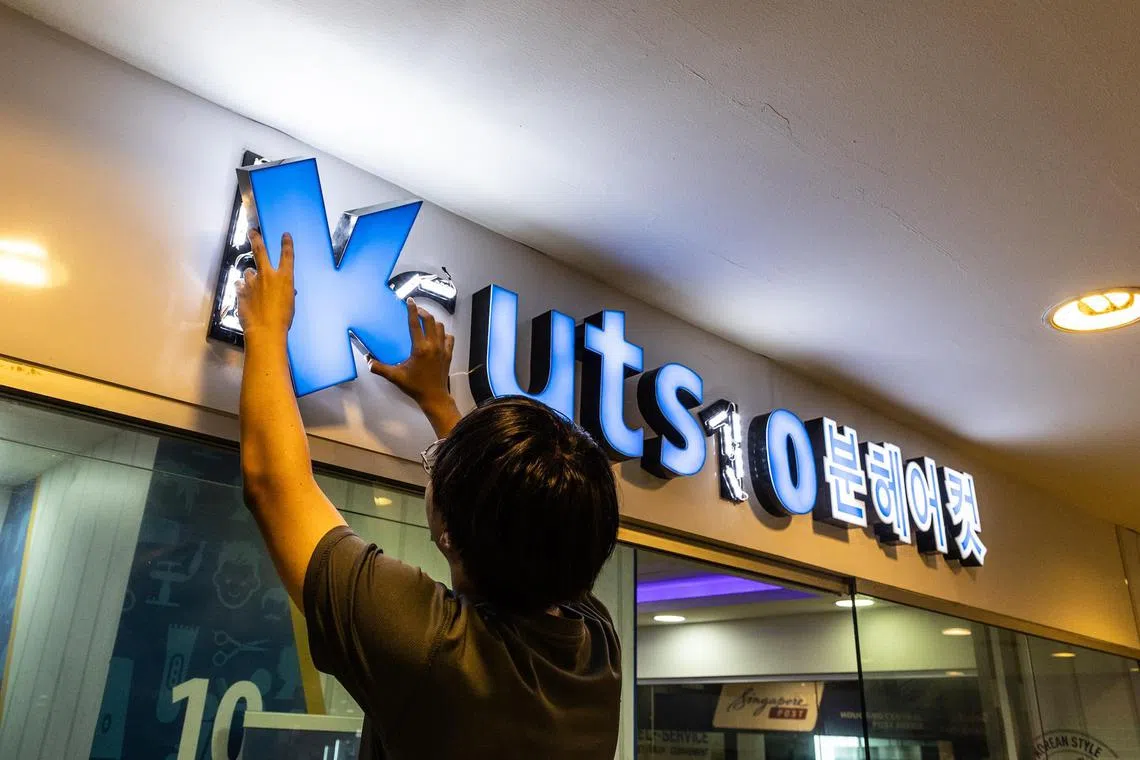
Mr Zames Chew fixing a client’s sign.
PHOTO: COURTESY OF ZAMES CHEW
Most of its customers are residential, but it counts among its regular corporate clients a famous hotpot chain, a coffee chain and an international school.
A rented detached house in Telok Kurau serves as the office for 18 staff, including 11 foreign workers. The company owns eight vans.
In an industry where complaints about vendors turning up late and overcharging are rife, Repair.sg aims to provide services professionally at a fair price, he says.
“We are not the cheapest because we would rather charge a customer 25 per cent more for a light that will last three years, than a ‘normal market rate’ for a light that will last one year,” he adds.
He gives a one-year warranty on most items he supplies and installs, compared with the industry average of up to two months. He also pays his foreign workers wages “above market rate”.
“I think we did the right thing at the right time because very few people were online eight years ago, and nobody (in this industry) had a website.”

Mr Zames Chew took night classes to obtain certifications in air-conditioning, electrical and plumbing services, so he could lead Repair.sg by example.
PHOTO: COURTESY OF ZAMES CHEW
Believing he should lead by example, he took night classes over the last few years to obtain certifications in air-conditioning, electrical and plumbing services. He is in the midst of completing examinations for electrical and plumbing licences.
His brother, a marketing diploma holder who has an air-con installer’s licence, is finishing up a certificate in pest control and signing up for an electrical services certification course in 2025.
Mr Chew says his semi-retired parents thought this was just another side hustle and did not take it seriously initially. But they now support him and his brother wholeheartedly, helping out when needed.
Mr Amos Chew says of working with his brother: “He was always this crazy.”
“It’s the best experience. It’s something which I cherish a lot,” he adds.
Mr Zames Chew says in return: “He has always wanted to do things with me, regardless of what they were. I could not have done any of this without him.”
The entrepreneur, who used to work seven days a week, now takes Sundays off to spend time with his girlfriend, a 24-year-old private tutor.
She is very supportive of his job, he says, just like the many customers who are surprised to see him turn up at their door. He and his brother now go on jobs weekly to connect with customers and find ways to improve their services.
“The Singaporean uncles are always like, ‘Wow, I wish more young Singaporeans would take up a trade like this, rather than work nine to five in an office’,” he says.
He once lived in a shelter, now he’s leading volunteers to give back in Singapore and Malaysia

Having lived in a shelter with his family for about 10 months, Mr Muhamad Imran Mean knows what it is like to have nothing, which drives his passion to pay it forward.
PHOTO: COURTESY OF MUHAMAD IMRAN MEAN
Mr Muhamad Imran Mean had just started Secondary 1 at Riverside Secondary School in 2014 when he was badly bullied.
A friend he lent money to refused to pay him back, kicked him in the back and spat on his face.
“I sat at home for about six months doing nothing, just crying,” says Mr Imran, 23, who was so affected, he skipped his examinations that year.
Seeing his distress, a relative helped him transfer in 2015 to Woodlands Secondary School, where he repeated Sec 1.
He joined the student council in Sec 2 and the teacher in charge encouraged the then introverted teenager to join grassroots activities to hone his leadership skills. He participated in meal distribution drives and outreach initiatives, among other things.
At home, though, he faced hardship when his parents decided to move back to Singapore in 2017, but could not find a suitable rental flat. His father, a security guard, had moved the family to Johor Bahru in 2009, when Mr Imran was eight, though he continued to attend school in Singapore.
The family of four stayed with his aunt for about 10 months, until a family service centre found them a shelter home a year later. It was a three-room flat in Woodlands which they shared with a family of six for 10 months.
During that time, he and his younger brother, now aged 19, relied on the school’s financial assistance scheme as their parents could not afford to give them pocket money. His father was the sole breadwinner, they had debts to settle, and their savings in ringgit converted to much less in Singapore dollars.
“I didn’t have a choice of what to eat. I didn’t have a proper bed to sleep in – it was one bed shared by four people. There were no options,” he recalls of that trying period, when he was in Sec 3. He would take on odd jobs like waiting tables to earn cash.
Things improved in late 2018, when his parents secured a two-room rental flat in the same estate. Then 17, he brainstormed ideas for a home-based business.
He started selling fried Oreos – a viral hit during the Ramadan bazaars that year – to schoolmates, earning $20 to $35 a day.
After a couple of weeks, the school’s discipline master put a stop to his enterprising venture, telling him: “I like your passion, but I don’t think it’s the right time.”
So he hunkered down for his N levels and passed all six subjects. The teen resumed his enterprising ways while studying at ITE College West for his Nitec diploma in travel and tourism services and Higher Nitec in leisure and travel operations between 2019 and 2021.
Instead of just selling food, he roped in others with home-based food businesses. He pivoted from food to becoming a middleman between service providers and customers as he realised he did not need to be physically present to earn money.
His social enterprise, Signaturesofimran Group (@signaturesofimran on Instagram), has generated a mid-six-figure revenue annually since 2022.
Its most popular services include cleaning – especially before festive periods – transport and manpower. It provides manpower for several large running events, such as the UOB Heartbeat Run, and counts among its bigger clients a regional e-commerce platform and Jamiyah Singapore, a Muslim non-profit.
Mr Imran is its chief executive and Mr Syakir Husny, 21, a volunteer-turned-friend, joined as a co-founder in early 2024. Mr Syakir holds a diploma in Islamic studies from Muhammadiyah Islamic College. They have no other full-time staff.
Mr Imran attributes his success to “the power of networking” since he was in secondary school.
Besides providing a one-stop shop that caters to many needs, he keeps abreast of consumer trends. For instance, vans used to be a popular choice for those making a day trip to JB, but these days, his clients prefer the plush interior of a multi-purpose vehicle like the Toyota Alphard.
“I’m always thinking: How can I keep up with the trends to provide more convenience to my clients? That’s how I gain their trust,” he says.
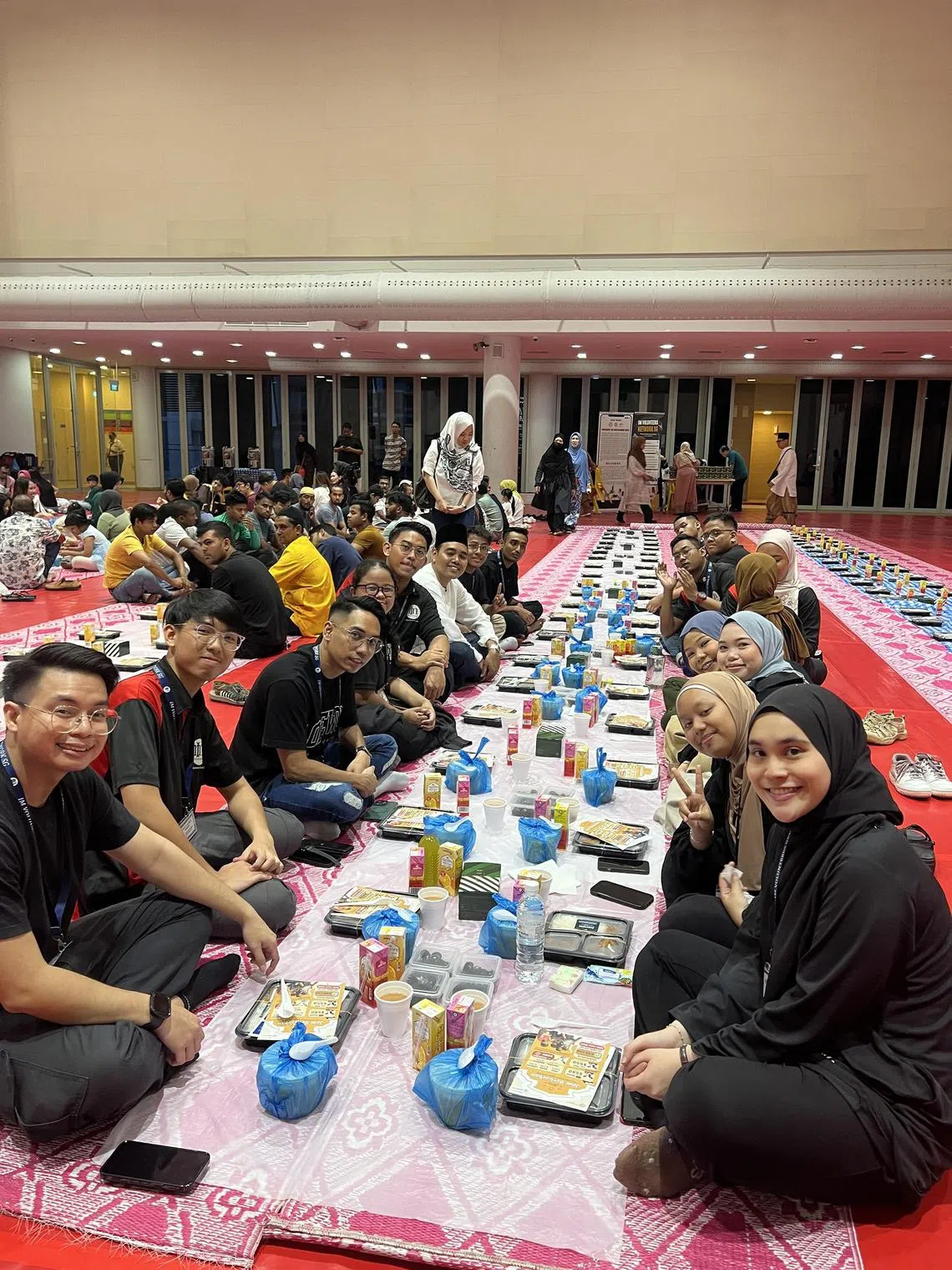
IM Volunteers Network SG’s Sponsor-An-Iftar is an annual initiative providing free meals during Ramadan.
PHOTO: COURTESY OF MUHAMAD IMRAN MEAN
Half of his company’s profits are set aside to fund the activities of IM Volunteers Network (IMVN), a non-profit he launched in November 2020 during the pandemic.
It started with a simple gesture of gratitude.
Mr Imran and three project mates from ITE decided to show their appreciation for essential workers, raising $2,500 through family and friends to buy fruits for people like taxi drivers and cleaners who lived in Woodlands, Admiralty, Sembawang and Marsiling.
After he was featured in an ITE publication and Berita Harian newspaper, his Instagram (IG) inbox exploded with requests to join and help out.
“Suddenly, my personal IG account became a network of volunteers,” he says, leading him to form IMVN SG.
The group started with small-scale activities such as beach and school clean-ups, but as its numbers swelled, it expanded its reach and has helped over 1,000 families here to date.
Run by youth, its youngest members are in upper primary school and its oldest are in their mid-20s.
In April, it partnered Cheng San Community Club to create a mini Hari Raya Bazaar for rental block residents in Ang Mo Kio. During Deepavali in October, volunteers gave away 100 goodie bags to migrant workers unable to be with their loved ones.
The network’s 390 registered volunteers here have also been distributing food rations to needy families every month since 2021. About 30 per cent of the team are at-risk youth referred to it by social service agencies or identified during its activities.
At the same time, Signaturesofimran group taps IMVN volunteers when it needs manpower for large events, which gives these youth a chance to earn pocket money.
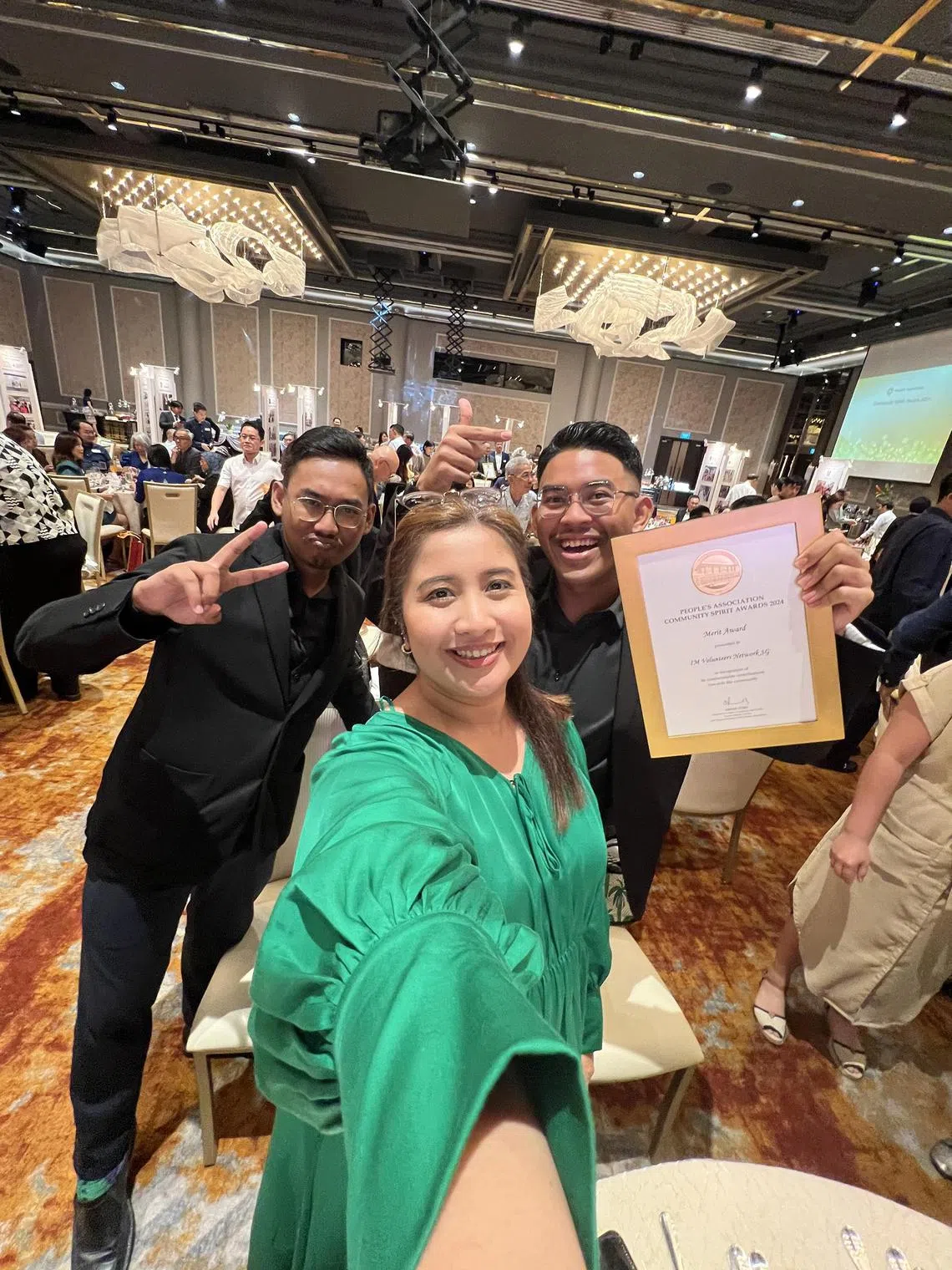
IM Volunteers Network SG’s Muhamad Imran Mean (right) and Danial Iskandar (left) with their Community Spirit Merit Award 2024. The non-profit was nominated by Member of Parliament Nadia Ahmad Samdin (centre).
PHOTO: COURTESY OF MUHAMAD IMRAN MEAN
The non-profit clinched a People’s Association Community Spirit Merit Award in 2024, given to organisations dedicated to building a caring and cohesive society.
Not content with just helping the needy here, he started IMVN MY in Malaysia in 2023 and has helped over 800 homeless people in JB, Melaka, Kuala Lumpur and Pulau Ketam. It has about 30 volunteers there.
Mr Imran, its founder and head coordinator, wanted to reach out to people sleeping on the streets when he lived in JB, which fuelled the cross-border initiative.
In 2026, it plans to start a branch in Indonesia to help villagers in Batam.
Mr Imran says his days of having nothing informed his desire to pay it forward.
“I always think back to why I started all this. There are still needy families and youth. How can I make a change in their lives? Let’s empower them,” he says.
Once, a young man was so moved when Mr Imran shared his story, that he asked him to be his mentor for life.
“I didn’t know my story could touch someone’s heart that way,” he says. “It was the sweetest thing I’ve heard.”
The affable bachelor has much to look forward to.
His family will move into a three-room HDB flat of their own in Woodlands in 2025. He plans to pursue a part-time degree in social work after national service while expanding his business.
He advises young people facing challenges: “Don’t lose hope. Find people who can provide you with guidance and support.
“Second, continue to develop yourself in one way or another. It’s not just about studies. Go out and improve your practical skills as well.”
She started a salad bar at age 20 instead of going to university, now it’s a six-figure social enterprise
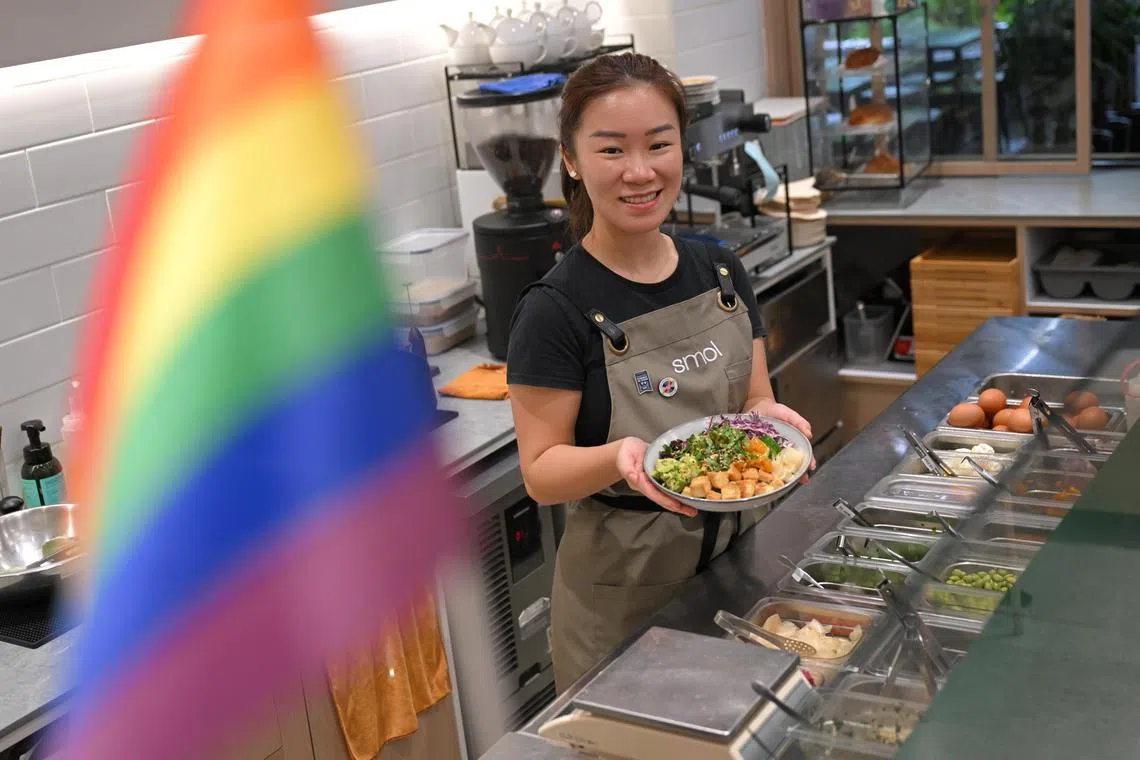
Instead of going to university, Ms Charmaine Low started a salad bar at age 20.
ST PHOTO: MARK CHEONG
Ms Charmaine Low, 28, dreamt of pursuing a career in Latin dance. But after three years in the School of the Arts, Singapore, she realised she was not good enough.
Her curriculum then was so different from the O-level track that her parents could not find her another school to transfer to.
They decided to move to Shanghai, where her Singaporean businessman father ran a factory making store fixtures, when she was 16 in 2012.
During her three years there, her passion for the hospitality industry bloomed. She worked part-time in a cafe after classes at an international school, earning the equivalent of $2 an hour just for the experience.
During a holiday in Singapore that year, she worked for free for about a month in an Italian restaurant, assembling salads and other appetisers. She “had so much fun”, she knew she wanted more of it.
So much so she decided against enrolling on a university after graduating with an International Baccalaureate diploma in 2014, shocking her parents, who hoped their only child would have the higher education they never had. Her housewife mother has secondary-level education, while her father is a secondary-school dropout.
“I didn’t want to go to university to study something I might not like,” she says.
“If I want to learn about business, I might as well use the money meant for school to start one. If I want to learn to cook, it’s best if I learn it in the kitchen.”
She also wanted to prove naysayers wrong, such as a university coordinator who told her she would fail in life without a degree.
But besides childhood side hustles, like selling old books and drinks from her semi-detached house in Simei, she had no other entrepreneurial experience.
To save for her business, she took on a variety of jobs in restaurants and bars here. She also worked as a business development executive in her father’s company for a year from late 2015, but found the business-to-business work “boring”.
At night and on weekends, she took on whatever side hustles she could find, including a lucrative stint as a bottle girl in a now defunct club at a five-star hotel in Singapore, where she would dance while serving bottles of champagne topped with sparklers.
At age 20, she threw her savings of $32,888 into a 100 sq ft salad bar in Eunos that she opened in 2017. She bought second-hand kitchen equipment from Carousell and scoured Pasir Panjang Wholesale Centre for vegetables every morning because suppliers would not deliver the small quantities she wanted.
But there was hardly any foot traffic in the office-cum-retail building. Joining delivery platforms did not help.
“In one week, I would get three (delivery) orders,” she says of her maiden venture, called Small Girl Salad after vegetable sellers called the petite Ms Low “xiao mei” (Mandarin for little sister).
After holding the fort alone for about 18 months, she closed that shop and secured a 300 sq ft outdoor kiosk at the then newly opened PLQ mall in August 2019, thanks to a $150,000 friends-and-family loan.
Business boomed at Smol – a play on the word “small” – for the first six months, although she struggled to figure out what menu items would sell without needing extensive kitchen prep.
Some of the more popular items on her salad and grain bowl menu today, many of which have punny names, are Kena Salmon (a play on “kena saman”, or hit with a summons in Malay), a salmon and soba dish; and Caul Me Maybe (a riff on the Carly Rae Jepsen song Call Me Maybe), featuring steak and cauliflower rice. Mains start at $14.90.
In early 2020, Covid-19 swept in and wiped out 90 per cent of her business, but thanks to rental rebates and the Government’s pandemic job support schemes, she did not have to let go of her two full-time staff members.
She also earned enough during her kiosk’s first six months to open a takeaway stall at Lau Pa Sat in November 2020, banking on the return of the office crowd in the Central Business District.
An unpleasant incident there put Smol in the spotlight. Closed-circuit footage of a man ripping up an LGBTQ flag in the outlet went viral in January 2021, when Ms Low posted it on social media.
The episode opened up a new client base she had not considered – corporate customers who liked her inclusive approach to business, which includes hiring workers with special needs. She learnt to set aside her “Asian mindset” of keeping mum about doing good.
“I realised a lot of multinational companies care a lot about their supply chain. That’s where we saw the biggest growth. If we serve 100 customers over 12 hours at the kiosk, we can do the same thing in one hour when we send it to a corporate client,” she says, adding that she started delivering to offices islandwide in bulk for events, lunches and meetings.
In 2023, she closed the Lau Pa Sat outlet when sales started to plateau. Still, Smol saw its revenue double in the last two years to the “mid six-figure range”. The company is now profitable most months, she says.
Corporate sales alone tripled in 2023, and Smol counts among its clients big multinational companies in industries such as shipping, real estate services, pharmaceuticals and social media.
In September 2024, she moved from her kiosk into a 1,200 sq ft cafe space across the road at PLQ Parkside, which is part of the PLQ complex. It has a bigger kitchen, which is needed for corporate orders.
Smol also became a social enterprise that year, as Ms Low sought to set up more purposeful partnerships with social service agencies. Four of her nine staff members are people with disabilities.
Patience is the top criterion for helping such staff members fit in, she says. Her neurodiverse hires may get frustrated that they cannot master certain skills, and their neurotypical colleagues sometimes complain about having to teach them again and again.
“It’s really about being open, playing to their strengths and working as a team to figure out how we can achieve the same goal, even though we all have different skill sets,” Ms Low says.
Smol’s parent company, Sputz, was among the recipients of the National Volunteer and Philanthropy Centre’s Company of Good Conferment in July 2024, the first year the centre recognised the contributions of purpose-driven businesses beyond corporate giving.
The young entrepreneur, who has set an ambitious target of doubling her revenue in 2025, debunks the myth that social enterprises operate like charities.
“We are chasing a double bottom line, the first being profitability, and the second being social impact. To do good, you have to have money,” she says.
She has had her fair share of trials as a young female boss trying to be taken seriously. During her early days at the PLQ kiosk, her then chef shouted at her in front of customers. She held her tongue and cried in the restroom later.
“It was very difficult getting people to respect me because it was a learning journey for me as well. My decisions and directions were questioned by my employees a lot of the time,” she says.
Such struggles taught her to keep learning and growing to earn the respect of others, while still staying true to her principles.
“You have to believe in yourself. That’s the only way people can believe in you,” she says.
Correction note: In an earlier version of the story, we said that the National Volunteer and Philanthropy Centre’s Company of Good Conferment in July 2024 was an inaugural event. The centre has since clarified that it is not.


